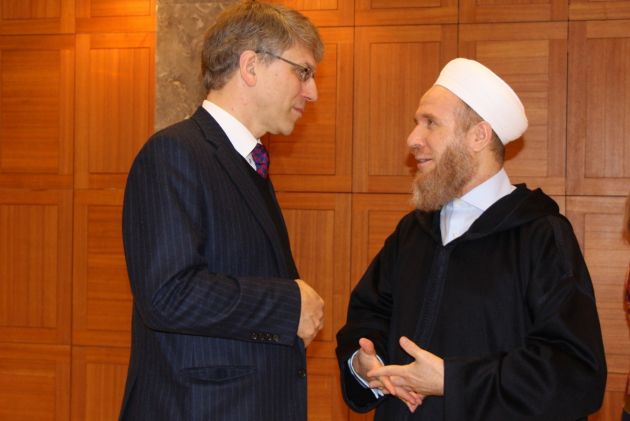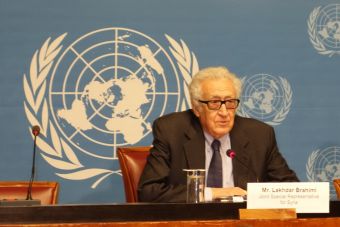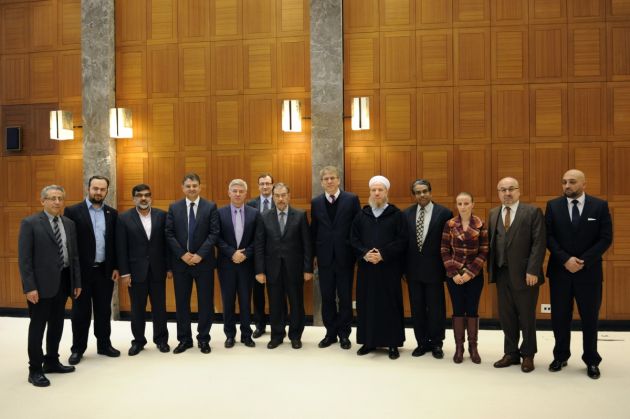Syrian opposition Islamic leader says: Release Christians held now

GENEVA - A leading Syrian Islamic scholar, one of the first Muslim leaders to support the uprising against the regime of President Bashar al-Assad, has made a strong call for opposition fighters to release Christians being held hostage in the conflict.
Sheikh Mohammad Abdel-Hady al-Yaaqubi, a Sunni Muslim scholar, issued his call in Arabic during a press conference on Friday at the Ecumenical Center in Geneva, the headquarters of the Swiss-based World Council of Churches.
Yaaqubi called upon "all Islamic militants to immediately release all those who are unjustly detained against their will, especially the innocent bishops, nuns and monks."
"This is not acceptable to Islam," said Yaaqubi describing as an embarrassment the abductions of Christians by opposition fighters who are believed to be militant Islamists.
"We must show respect to people of all faiths. No men and women of any faith should be subject to humiliation and abduction," said Yaaqubi.
He called on the abductors to "release all the hostages now."

In April 2013 Archbishop Mar Yohanna Gregorios Ibrahim from the Syriac Orthodox Church and Archbishop Paul Yazigi from the Greek Orthodox Church of Antioch were kidnapped near Aleppo while returning from a humanitarian mission. Later in December 2013, 12 nuns were also kidnapped.
Other Christians have also been abducted and involved in targetted killings, but most of Syrian Christian fatalities have been in the cross-fire of the war.
The Syrians requested Friday's meeting after receiving a WCC message calling for an end to the conflict delivered to both sides of the Geneva 2 talks by Lakhdar Brahimi, the UN representative leading the talks and the United Nations-Arab League joint representative for Syria.
During the 90-minute meeting Yaaqubi strongly condemned the kidnapping of the nuns of the Ste Thecla Convent in Maaloula, and the two Orthodox bishops from Aleppo last year in Syria.
GENEVA 2
The meeting with the WCC came after a second round of talks aimed at bringing peace to Syria known as Geneva 2 yielded few results as furious fighting raged in the Middle East country.
On Saurday Brahimi opened direct talks between the Syrian government and opposition Saturday in hopes of breaking the impasse, but it came to nothing.
"I am very very sorry and I apologise to the Syrian people that their hopes which were very very high here, that something will happen here," Brahimi told a news conference after the talks.
"I think that the little that has been achieved in Homs gave them even more hope that maybe this is the beginning of coming out of this horrible crisis they are in."
In his meeting with members of the Syrian opposition on Friday, Tveit said, "The immediate end of the suffering of the people in Syria must now be the focus for all parties in the Geneva 2 talks."
He stressed, "This includes all parties in the conflict."
The ecumenical message presented by the WCC, which was given to Brahimi in mid-January before the talks, stresses the need for "immediate cessation of all armed confrontation and hostility within Syria".
It requests that "all vulnerable communities in Syria and refugees in neighbouring countries receive appropriate humanitarian assistance."
It further urges "a comprehensive and inclusive process toward establishing a just peace and rebuilding Syria."
Representatives from the Syrian opposition included Sheikh -Yaaqubi, Islamic scholar; Badr Jamous, vice-president of the Syrian National Coalition; Abdul-Ahad Steifo from the Assyrian Democratic Organization; Mohammad Farouk Tayfour, deputy leader of the Syrian Muslim Brotherhood; Imad Eldin Rashid, president of the Syrian National Movement.
In the meeting Tveit invoked prayers for peace in Syria, saying that with concern for security of all Syrians, including Christians, Muslims, and people of different faiths "we hope for a 'just peace' in Syria, a vision to which the WCC is deeply committed.
"We as religious leaders have to carry the hope that miracles are possible and that there will be peace," he said. "If we are not doing this, who will?"
Tveit said that "we must work together for a future for Syria, where equal rights, stability, democracy and freedom for religion and expression for all" can prevail.
